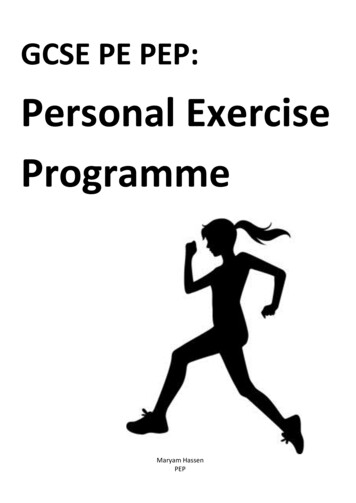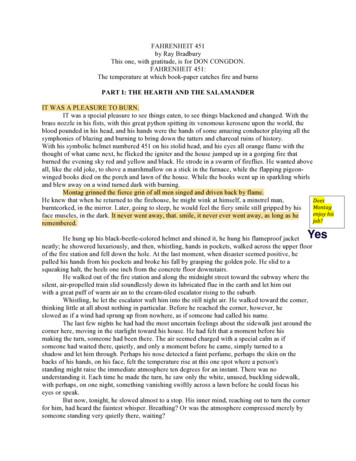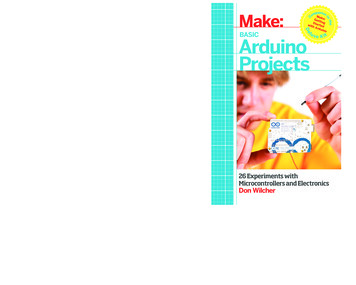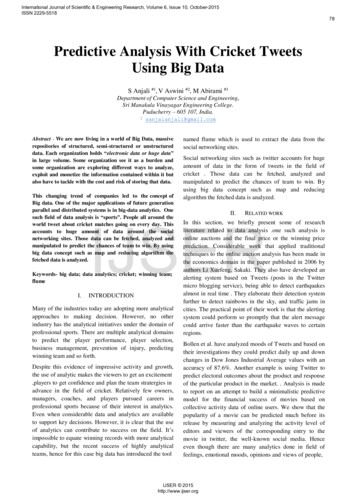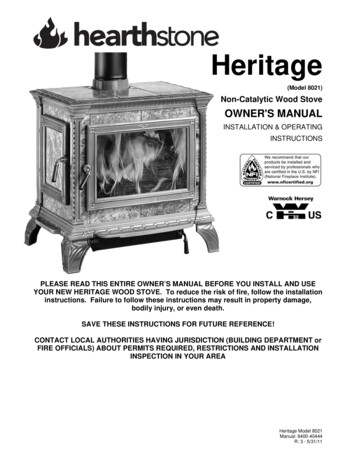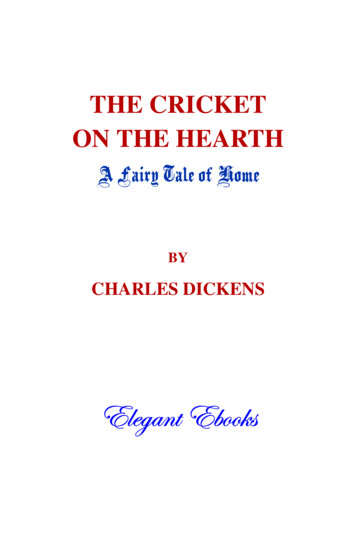
Transcription
THE CRICKETON THE HEARTH 08AH )0;4 5 4 BYCHARLES DICKENS7 WYS f f 77 T a a ] e
TOLORD JEFFREYTHIS LITTLE STORY IS INSCRIBED,WITHTHE AFFECTION AND ATTACHMENT OF HIS FRIEND,THE AUTHOR.December, 1845.
CONTENTSCHIRP THE FIRSTCHIRP THE SECONDCHIRP THE psonD. MACLISE, R.A.TITLEG. DalzielD. MACLISE, R.A.CHIRP THE FIRSTG. DalzielR. DOYLETHE CARRIER’S CARTT. WilliamsC. STANFIELD, R.A.JOHN’S ARRIVALE. DalzielJ. LEECHJOHN AND DOTSwainJ. LEECHCHIRP THE SECONDE. DalzielR. DOYLECALEB AT WORKG. DalzielJ. LEECHBOXERT. WilliamsE. LANDSEER, R.A.TILLY SLOWBOYGrovesJ. LEECHMRS. FIELDING’S LECTUREE. DalzielJ. LEECHCHIRP THE THIRDT. WilliamsR. DOYLEJOHN’S REVERIEGrovesJ. LEECHTHE DANCESwainJ. LEECH
THE CRICKET ON THE HEARTHkettle began it! Don’t tell me what Mrs. Peerybinglesaid. I know better. Mrs. Peerybingle may leave iton record to the end of time that she couldn’t saywhich of them began it; but, I say the kettle did. Iought to know, I hope! The kettle began it, full fiveminutes by the littlewaxy-faced Dutch clockin the corner, beforethe Cricket uttered achirp.As if the clockhadn’t finished striking,and the convulsive littleHaymaker at the top ofit, jerking away rightand left with a scythe infront of a Moorish Palace, hadn’t mowed down half an acre ofimaginary grass before the Cricket joined in at all!Why, I am not naturally positive. Every one knows that. Iwouldn’t set my own opinion against the opinion of Mrs. Peerybingle,unless I were quite sure, on any account whatever. Nothing shouldinduce me. But, this is a question of fact. And the fact is, that the7
THE CRICKET ON THE HEARTHkettle began it, at least five minutes before the Cricket gave any signof being in existence. Contradict me, and I’ll say ten.Let me narrate exactly how it happened. I should have proceededto do so in my very first word, but for this plain consideration—if Iam to tell a story I must begin at the beginning; and how is it possibleto begin at the beginning, without beginning at the kettle?It appeared as if there were a sort of match, or trial of skill, youmust understand, between the kettle and the Cricket. And this is whatled to it, and how it came about.Mrs. Peerybingle, going out into the raw twilight, and clickingover the wet stones in a pair of pattens that worked innumerablerough impressions of the first proposition in Euclid all about theyard—Mrs. Peerybingle filled the kettle at the water-butt. Presentlyreturning, less the pattens (and a good deal less, for they were tall andMrs. Peerybingle was but short), she set the kettle on the fire. In doingwhich she lost her temper, or mislaid it for an instant; for, the waterbeing uncomfortably cold, and in that slippy, slushy, sleety sort ofstate wherein it seems to penetrate through every kind of substance,patten rings included—had laid hold of Mrs. Peerybingle’s toes, andeven splashed her legs. And when we rather plume ourselves (withreason too) upon our legs, and keep ourselves particularly neat inpoint of stockings, we find this, for the moment, hard to bear.Besides, the kettle was aggravating and obstinate. It wouldn’tallow itself to be adjusted on the top bar; it wouldn’t hear ofaccommodating itself kindly to the knobs of coal; it would leanforward with a drunken air, and dribble, a very Idiot of a kettle, on thehearth. It was quarrelsome, and hissed and spluttered morosely at thefire. To sum up all, the lid, resisting Mrs. Peerybingle’s fingers, firstof all turned topsy-turvy, and then, with an ingenious pertinacitydeserving of a better cause, dived sideways in—down to the verybottom of the kettle. And the hull of the Royal George has nevermade half the monstrous resistance to coming out of the water, whichthe lid of that kettle employed against Mrs. Peerybingle, before shegot it up again.It looked sullen and pig-headed enough, even then; carrying itshandle with an air of defiance, and cocking its spout pertly and8
CHARLES DICKENSmockingly at Mrs. Peerybingle, as if it said, “I won’t boil. Nothingshall induce me!”But Mrs. Peerybingle, with restored good humour, dusted herchubby little hands against each other, and sat down before the kettle,laughing. Meantime, the jolly blaze uprose and fell, flashing andgleaming on the little Haymaker at the top of the Dutch clock, untilone might have thought he stood stock still before the MoorishPalace, and nothing was in motion but the flame.He was on the move, however; and had his spasms, two to thesecond, all right and regular. But, his sufferings when the clock wasgoing to strike, were frightful to behold; and, when a Cuckoo lookedout of a trap-door in the Palace, and gave note six times, it shook him,each time, like a spectral voice—or like a something wiry, plucking athis legs.It was not until a violent commotion and a whirring noise amongthe weights and ropes below him had quite subsided, that this terrifiedHaymaker became himself again. Nor was he startled without reason;for these rattling, bony skeletons of clocks are very disconcerting intheir operation, and I wonder very much how any set of men, but mostof all how Dutchmen, can have had a liking to invent them. There is apopular belief that Dutchmen love broad cases and much clothing fortheir own lower selves; and they might know better than to leave theirclocks so very lank and unprotected, surely.Now it was, you observe, that the kettle began to spend theevening. Now it was, that the kettle, growing mellow and musical,began to have irrepressible gurglings in its throat, and to indulge inshort vocal snorts, which it checked in the bud, as if it hadn’t quitemade up its mind yet, to be good company. Now it was, that after twoor three such vain attempts to stifle its convivial sentiments, it threwoff all moroseness, all reserve, and burst into a stream of song so cosyand hilarious, as never maudlin nightingale yet formed the least ideaof.So plain too! Bless you, you might have understood it like abook—better than some books you and I could name, perhaps. Withits warm breath gushing forth in a light cloud which merrily andgracefully ascended a few feet, then hung about the chimney-corner9
THE CRICKET ON THE HEARTHas its own domestic Heaven, it trolled its song with that strong energyof cheerfulness, that its iron body hummed and stirred upon the fire;and the lid itself, the recently rebellious lid—such is the influence of abright example—performed a sort of jig, and clattered like a deaf anddumb young cymbal that had never known the use of its twin brother.That this song of the kettle’s was a song of invitation andwelcome to somebody out of doors: to somebody at that momentcoming on, towards the snug small home and the crisp fire: there is nodoubt whatever. Mrs. Peerybingle knew it, perfectly, as she satmusing before the hearth. It’s a dark night, sang the kettle, and therotten leaves are lying by the way; and, above, all is mist anddarkness, and, below, all is mire and clay; and there’s only one reliefin all the sad and murky air; and I don’t know that it is one, for it’snothing but a glare; of deep and angry crimson, where the sun andwind together; set a brand upon the clouds for being guilty of suchweather; and the widest open country is a long dull streak of black;and there’s hoar-frost on the finger-post, and thaw upon the track; andthe ice it isn’t water, and the water isn’t free; and you couldn’t saythat anything is what it ought to be; but he’s coming, coming,coming!——And here, if you like, the Cricket DID chime in! with a Chirrup,Chirrup, Chirrup of such magnitude, by way of chorus; with a voiceso astoundingly disproportionate to its size, as compared with thekettle; (size! you couldn’t see it!) that if it had then and there burstitself like an overcharged gun, if it had fallen a victim on the spot, andchirruped its little body into fifty pieces, it would have seemed anatural and inevitable consequence, for which it had expresslylaboured.The kettle had had the last of its solo performance. It perseveredwith undiminished ardour; but the Cricket took first fiddle and kept it.Good Heaven, how it chirped! Its shrill, sharp, piercing voiceresounded through the house, and seemed to twinkle in the outerdarkness like a star. There was an indescribable little trill and tremblein it, at its loudest, which suggested its being carried off its legs, andmade to leap again, by its own intense enthusiasm. Yet they went verywell together, the Cricket and the kettle. The burden of the song was10
CHARLES DICKENSstill the same; and louder, louder, louder still, they sang it in theiremulation.The fair little listener—for fair she was, and young: thoughsomething of what is called the dumpling shape; but I don’t myselfobject to that—lighted a candle, glanced at the Haymaker on the topof the clock, who was getting in a pretty average crop of minutes; andlooked out of the window, where she saw nothing, owing to thedarkness, but her own face imaged in the glass. And my opinion is(and so would yours have been), that she might have looked a longway, and seen nothing half so agreeable. When she came back, andsat down in her former seat, the Cricket and the kettle were stillkeeping it up, with a perfect fury of competition. The kettle’s weakside clearly being, that he didn’t know when he was beat.There was all the excitement of a race about it. Chirp, chirp,chirp! Cricket a mile ahead. Hum, hum, hum—m—m! Kettle makingplay in the distance, like a great top. Chirp, chirp, chirp! Cricketround the corner. Hum, hum, hum—m—m! Kettle sticking to him inhis own way; no idea of giving in. Chirp, chirp, chirp! Cricket fresherthan ever. Hum, hum, hum—m—m! Kettle slow and steady. Chirp,chirp, chirp! Cricket going in to finish him. Hum, hum, hum—m—m!Kettle not to be finished. Until at last they got so jumbled together, inthe hurry-skurry, helter-skelter, of the match, that whether the kettlechirped and the Cricket hummed, or the Cricket chirped and the kettlehummed, or they both chirped and both hummed, it would have takena clearer head than yours or mine to have decided with anything likecertainty. But, of this, there is no doubt: that, the kettle and theCricket, at one and the same moment, and by some power ofamalgamation best known to themselves, sent, each, his fireside songof comfort streaming into a ray of the candle that shone out throughthe window, and a long way down the lane. And this light, bursting ona certain person who, on the instant, approached towards it throughthe gloom, expressed the whole thing to him, literally in a twinkling,and cried, “Welcome home, old fellow! Welcome home, my boy!”This end attained, the kettle, being dead beat, boiled over, andwas taken off the fire. Mrs. Peerybingle then went running to thedoor, where, what with the wheels of a cart, the tramp of a horse, the11
THE CRICKET ON THE HEARTHvoice of a man, the tearing in and out of an excited dog, and thesurprising and mysterious appearance of a baby, there was soon thevery What’s-his-name to pay.Where the baby came from, or how Mrs. Peerybingle got hold ofit in that flash of time, Idon’t know. But a live babytherewas,inMrs.Peerybingle’s arms; and apretty tolerable amount ofpride she seemed to have init, when she was drawngently to the fire, by asturdy figure of a man,much taller and much olderthan herself, who had to stoop a long waydown, to kiss her. But she was worth thetrouble. Six foot six, with the lumbago,might have done it.“Oh goodness, John!” said Mrs. P.“What a state you are in with the weather!”He was something the worse for it,undeniably. The thick mist hung in clotsupon his eyelashes like candied thaw; andbetween the fog and fire together, therewere rainbows in his very whiskers.“Why, you see, Dot,” John madeanswer, slowly, as he unrolled a shawl fromabout his throat; and warmed his hands; “it—it an’t exactly summerweather. So, no wonder.”“I wish you wouldn’t call me Dot, John. I don’t like it,” saidMrs. Peerybingle: pouting in a way that clearly showed she did like it,very much.“Why what else are you?” returned John, looking down upon herwith a smile, and giving her waist as light a squeeze as his huge handand arm could give. “A dot and”—here he glanced at the baby—“a12
CHARLES DICKENSdot and carry—I won’t say it, for fear I should spoil it; but I was verynear a joke. I don’t know as ever I was nearer.”He was often near to something or other very clever, by his ownaccount: this lumbering, slow, honest John; this John so heavy, but solight of spirit; so rough upon the surface, but so gentle at the core; sodull without, so quick within; so stolid, but so good! Oh MotherNature, give thy children the true poetry of heart that hid itself in thispoor Carrier’s breast—he was but a Carrier by the way—and we canbear to have them talking prose, and leading lives of prose; and bearto bless thee for their company!It was pleasant to see Dot, with her little figure, and her baby inher arms: a very doll of a baby: glancing with a coquettishthoughtfulness at the fire, and inclining her delicate little head justenough on one side to let it rest in an odd, half-natural, half-affected,wholly nestling and agreeable manner, on the great rugged figure ofthe Carrier. It was pleasant to see him, with his tender awkwardness,endeavouring to adapt his rude support to her slight need, and makehis burly middle-age a leaning-staff not inappropriate to her bloomingyouth. It was pleasant to observe how Tilly Slowboy, waiting in thebackground for the baby, took special cognizance (though in herearliest teens) of this grouping; and stood with her mouth and eyeswide open, and her head thrust forward, taking it in as if it were air.Nor was it less agreeable to observe how John the Carrier, referencebeing made by Dot to the aforesaid baby, checked his hand when onthe point of touching the infant, as if he thought he might crack it; andbending down, surveyed it from a safe distance, with a kind ofpuzzled pride, such as an amiable mastiff might be supposed to show,if he found himself, one day, the father of a young canary.“An’t he beautiful, John? Don’t he look precious in his sleep?”“Very precious,” said John. “Very much so. He generally isasleep, an’t he?”“Lor, John! Good gracious no!”“Oh,” said John, pondering. “I thought his eyes was generallyshut. Halloa!”“Goodness, John, how you startle one!”“It an’t right for him to turn ’em up in that way!” said the13
THE CRICKET ON THE HEARTHastonished Carrier, “is it? See how he’s winking with both of ’em atonce! And look at his mouth! Why he’s gasping like a gold and silverfish!”“You don’t deserve to be a father, you don’t,” said Dot, with allthe dignity of an experienced matron. “But how should you knowwhat little complaints children are troubled with, John! You wouldn’tso much as know their names, you stupid fellow.” And when she hadturned the baby over on her left arm, and had slapped its back as arestorative, she pinched her husband’s ear, laughing.“No,” said John, pulling off his outer coat. “It’s very true, Dot. Idon’t know much about it. I only know that I’ve been fighting prettystiffly with the wind to-night. It’s been blowing north-east, straightinto the cart, the whole way home.”“Poor old man, so it has!” cried Mrs. Peerybingle, instantlybecoming very active. “Here! Take the precious darling, Tilly, while Imake myself of some use. Bless it, I could smother it with kissing it, Icould! Hie then, good dog! Hie, Boxer, boy! Only let me make the teafirst, John; and then I’ll help you with the parcels, like a busy bee.‘How doth the little’—and all the rest of it, you know, John. Did youever learn ‘how doth the little,’ when you went to school, John?”“Not to quite know it,” John returned. “I was very near it once.But I should only have spoilt it, I dare say.”“Ha ha,” laughed Dot. She had the blithest little laugh you everheard. “What a dear old darling of a dunce you are, John, to be sure!”Not at all disputing this position, John went out to see that theboy with the lantern, which had been dancing to and fro before thedoor and window, like a Will of the Wisp, took due care of the horse;who was fatter than you would quite believe, if I gave you hismeasure, and so old that his birthday was lost in the mists of antiquity.Boxer, feeling that his attentions were due to the family in general,and must be impartially distributed, dashed in and out withbewildering inconstancy; now, describing a circle of short barksround the horse, where he was being rubbed down at the stable-door;now feigning to make savage rushes at his mistress, and facetiouslybringing himself to sudden stops; now, eliciting a shriek from TillySlowboy, in the low nursing-chair near the fire, by the unexpected14
CHARLES DICKENSapplication of his moist nose to her countenance; now, exhibiting anobtrusive interest in the baby; now, going round and round upon thehearth, and lying down as if he had established himself for the night;now, getting up again, and taking that nothing of a fag-end of a tail ofhis, out into the weather, as if he had just remembered anappointment, and was off, at a round trot, to keep it.“There! There’s the teapot, ready on the hob!” said Dot; asbriskly busy as a child at play at keepinghouse. “And there’s the old knuckle of ham;and there’s the butter; and there’s thecrusty loaf, and all! Here’s the clothesbasket for the small parcels, John, ifyou’ve got any there—where are you,John? Don’t let the dear child fall underthe grate, Tilly, whatever you do!”It may be noted of Miss Slowboy,in spite of her rejecting thecaution with some vivacity,that she had a rare andsurprising talent for gettingthis baby into difficulties:and had several timesimperilled its short life, ina quiet way peculiarly herown. She was of a spareand straight shape, thisyoung lady, insomuch thather garments appeared tobe in constant danger ofsliding off those sharppegs, her shoulders, onwhich they were loosely hung. Her costume was remarkable for thepartial development, on all possible occasions, of some flannelvestment of a singular structure; also for affording glimpses, in theregion of the back, of a corset, or pair of stays, in colour a dead-green.Being always in a state of gaping admiration at everything, and15
THE CRICKET ON THE HEARTHabsorbed, besides, in the perpetual contemplation of her mistress’sperfections and the baby’s, Miss Slowboy, in her little errors ofjudgment, may be said to have done equal honour to her head and toher heart; and though these did less honour to the baby’s head, whichthey were the occasional means of bringing into contact with dealdoors, dressers, stair-rails, bed-posts, and other foreign substances,still they were the honest results of Tilly Slowboy’s constantastonishment at finding herself so kindly treated, and installed in sucha comfortable home. For, the maternal and paternal Slowboy werealike unknown to Fame, and Tilly had been bred by public charity, afoundling; which word, though only differing from fondling by onevowel’s length, is very different in meaning, and expresses quiteanother thing.To have seen little Mrs. Peerybingle come back with herhusband, tugging at the clothes-basket, and making the moststrenuous exertions to do nothing at all (for he carried it), would haveamused you almost as much as it amused him. It may have entertainedthe Cricket too, for anything I know; but, certainly, it now began tochirp again, vehemently.“Heyday!” said John, in his slow way. “It’s merrier than ever, tonight, I think.”“And it’s sure to bring us good fortune, John! It always has doneso. To have a Cricket on the Hearth, is the luckiest thing in all theworld!”John looked at her as if he had very nearly got the thought intohis head, that she was his Cricket in chief, and he quite agreed withher. But, it was probably one of his narrow escapes, for he saidnothing.“The first time I heard its cheerful little note, John, was on thatnight when you brought me home—when you brought me to my newhome here; its little mistress. Nearly a year ago. You recollect, John?”O yes. John remembered. I should think so!“Its chirp was such a welcome to me! It seemed so full ofpromise and encouragement. It seemed to say, you would be kind andgentle with me, and would not expect (I had a fear of that, John, then)to find an old head on the shoulders of your foolish little wife.”16
CHARLES DICKENSJohn thoughtfully patted one of the shoulders, and then the head,as though he would have said No, no; he had had no such expectation;he had been quite content to take them as they were. And really hehad reason. They were very comely.“It spoke the truth, John, when it seemed to say so; for you haveever been, I am sure, the best, the most considerate, the mostaffectionate of husbands to me. This has been a happy home, John;and I love the Cricket for its sake!”“Why so do I then,” said the Carrier. “So do I, Dot.”“I love it for the many times I have heard it, and the manythoughts its harmless music has given me. Sometimes, in the twilight,when I have felt a little solitary and down-hearted, John—before babywas here to keep me company and make the house gay—when I havethought how lonely you would be if I should die; how lonely I shouldbe if I could know that you had lost me, dear; its Chirp, Chirp, Chirpupon the hearth, has seemed to tell me of another little voice, sosweet, so very dear to me, before whose coming sound my troublevanished like a dream. And when I used to fear—I did fear once,John, I was very young you know—that ours might prove to be an illassorted marriage, I being such a child, and you more like myguardian than my husband; and that you might not, however hard youtried, be able to learn to love me, as you hoped and prayed you might;its Chirp, Chirp, Chirp has cheered me up again, and filled me withnew trust and confidence. I was thinking of these things to-night,dear, when I sat expecting you; and I love the Cricket for their sake!”“And so do I,” repeated John. “But, Dot? I hope and pray that Imight learn to love you? How you talk! I had learnt that, long before Ibrought you here, to be the Cricket’s little mistress, Dot!”She laid her hand, an instant, on his arm, and looked up at himwith an agitated face, as if she would have told him something. Nextmoment she was down upon her knees before the basket, speaking ina sprightly voice, and busy with the parcels.“There are not many of them to-night, John, but I saw somegoods behind the cart, just now; and though they give more trouble,perhaps, still they pay as well; so we have no reason to grumble, have17
THE CRICKET ON THE HEARTHwe? Besides, you have been delivering, I dare say, as you camealong?”“Oh yes,” John said. “A good many.”“Why what’s this round box? Heart alive, John, it’s a weddingcake!”“Leave a woman alone to find out that,” said John, admiringly.“Now a man would never have thought of it. Whereas, it’s my beliefthat if you was to pack a wedding-cake up in a tea-chest, or a turn-upbedstead, or a pickled salmon keg, or any unlikely thing, a womanwould be sure to find it out directly. Yes; I called for it at the pastrycook’s.”“And it weighs I don’t know what—whole hundredweights!”cried Dot, making a great demonstration of trying to lift it. “Whose isit, John? Where is it going?”“Read the writing on the other side,” said John.“Why, John! My Goodness, John!”“Ah! who’d have thought it!” John returned.“You never mean to say,” pursued Dot, sitting on the floor andshaking her head at him, “that it’s Gruff and Tackleton thetoymaker!”John nodded.Mrs. Peerybingle nodded also, fifty times at least. Not inassent—in dumb and pitying amazement; screwing up her lips thewhile with all their little force (they were never made for screwing up;I am clear of that), and looking the good Carrier through and through,in her abstraction. Miss Slowboy, in the mean time, who had amechanical power of reproducing scraps of current conversation forthe delectation of the baby, with all the sense struck out of them, andall the nouns changed into the plural number, inquired aloud of thatyoung creature, Was it Gruffs and Tackletons the toymakers then, andWould it call at Pastry-cooks for wedding-cakes, and Did its mothersknow the boxes when its fathers brought them homes; and so on.“And that is really to come about!” said Dot. “Why, she and Iwere girls at school together, John.”18
CHARLES DICKENSHe might have been thinking of her, or nearly thinking of her,perhaps, as she was in that same school time. He looked upon herwith a thoughtful pleasure, but he made no answer.“And he’s as old! As unlike her!—Why, how many years olderthan you, is Gruff and Tackleton, John?”“How many more cups of tea shall I drink to-night at one sitting,than Gruff and Tackleton ever took in four, I wonder!” replied John,good-humouredly, as he drew a chair to the round table, and began atthe cold ham. “As to eating, I eat but little; but that little I enjoy, Dot.”Even this, his usual sentiment at meal times, one of his innocentdelusions (for his appetite was always obstinate, and flatlycontradicted him), awoke no smile in the face of his little wife, whostood among the parcels, pushing the cake-box slowly from her withher foot, and never once looked, though her eyes were cast down too,upon the dainty shoe she generally was so mindful of. Absorbed inthought, she stood there, heedless alike of the tea and John (althoughhe called to her, and rapped the table with his knife to startle her),until he rose and touched her on the arm; when she looked at him fora moment, and hurried to her place behind the teaboard, laughing ather negligence. But, not as she had laughed before. The manner andthe music were quite changed.The Cricket, too, had stopped. Somehow the room was not socheerful as it had been. Nothing like it.“So, these are all the parcels, are they, John?” she said, breakinga long silence, which the honest Carrier had devoted to the practicalillustration of one part of his favourite sentiment—certainly enjoyingwhat he ate, if it couldn’t be admitted that he ate but little. “So, theseare all the parcels; are they, John?”“That’s all,” said John. “Why—no—I—” laying down his knifeand fork, and taking a long breath. “I declare—I’ve clean forgottenthe old gentleman!”“The old gentleman?”“In the cart,” said John. “He was asleep, among the straw, thelast time I saw him. I’ve very nearly remembered him, twice, since Icame in; but he went out of my head again. Holloa! Yahip there!Rouse up! That’s my hearty!”19
THE CRICKET ON THE HEARTHJohn said these latter words outside the door, whither he hadhurried with the candle in his hand.Miss Slowboy, conscious of some mysterious reference to TheOld Gentleman, and connecting in her mystified imagination certainassociations of a religious nature with the phrase, was so disturbed,that hastily rising from the low chair by the fire to seek protectionnear the skirts of her mistress, and coming into contact as she crossedthe doorway with an ancient Stranger, she instinctively made a chargeor butt at him with the only offensive instrument within her reach.This instrument happening to be the baby, great commotion and alarmensued, which the sagacity of Boxer rather tended to increase; for,that good dog, more thoughtful than its master, had, it seemed, beenwatching the old gentleman in his sleep, lest he should walk off with afew young poplar trees that were tied up behind the cart; and he stillattended on him very closely, worrying his gaiters in fact, and makingdead sets at the buttons.“You’re such an undeniable good sleeper, sir,” said John, whentranquillity was restored; in the mean time the old gentleman hadstood, bareheaded and motionless, in the centre of the room; “that Ihave half a mind to ask you where the other six are—only that wouldbe a joke, and I know I should spoil it. Very near though,” murmuredthe Carrier, with a chuckle; “very near!”The Stranger, who had long white hair, good features, singularlybold and well defined for an old man, and dark, bright, penetratingeyes, looked round with a smile, and saluted the Carrier’s wife bygravely inclining his head.His garb was very quaint and odd—a long, long way behind thetime. Its hue was brown, all over. In his hand he held a great brownclub or walking-stick; and striking this upon the floor, it fell asunder,and became a chair. On which he sat down, quite composedly.“There!” said the Carrier, turning to his wife. “That’s the way Ifound him, sitting by the roadside! Upright as a milestone. Andalmost as deaf.”“Sitting in the open air, John!”20
CHARLES DICKENS“In the open air,” replied the Carrier, “just at dusk. ‘CarriagePaid,’ he said; and gave me eighteenpence. Then he got in. And therehe is.”“He’s going, John, I think!”Not at all. He was only going to speak.“If you please, I was to be left till called for,” said the Stranger,mildly. “Don’t mind me.”With that, he took a pair of spectacles from one of his largepockets, and a book from another, and leisurely began to read.Making no more of Boxer than if he had been a house lamb!The Carrier and his wife exchanged a look of perplexity. TheStranger raised his head; and glancing from the latter to the former,said,“Your daughter, my good friend?”“Wife,” returned John.“Niece?” said the Stranger.“Wife,” roared John.“Indeed?” observed the Stranger. “Surely? Very young!”He quietly turned over, and resumed his reading. But, before hecould have read two lines, he again interrupted himself to say:“Baby, yours?”John gave him a gigantic nod; equivalent to an answer in theaffirmative, delivered through a speaking trumpet.“Girl?”“Bo-o-oy!” roared John.“Also very young, eh?”Mrs. Peerybingle instantly struck in. “Two months and three daays! Vaccinated just six weeks ago-o! Took very fine-ly! Considered,by the doctor, a remarkably beautiful chi-ild! Equal to the general runof children at five months o-old! Takes notice, in a way
That this song of the kettle’s was a song of invitation and welcome to somebody out of doors: to somebody at that moment coming on, towards the snug small home and the crisp fire: there is no doubt whatever. Mrs. Peerybingle knew it, perfectly, as she sat musing befor
